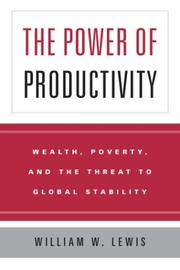| Listing 1 - 1 of 1 |
Sort by
|

ISBN: 0226476766 0226476987 9786612538094 0226477002 1282538098 9780226477008 9780226476766 9780226476988 Year: 2004 Publisher: Chicago : University of Chicago Press,
Abstract | Keywords | Export | Availability | Bookmark
 Loading...
Loading...Choose an application
- Reference Manager
- EndNote
- RefWorks (Direct export to RefWorks)
The disparity between rich and poor countries is the most serious, intractable problem facing the world today. The chronic poverty of many nations affects more than the citizens and economies of those nations; it threatens global stability as the pressures of immigration become unsustainable and rogue nations seek power and influence through extreme political and terrorist acts. To address this tenacious poverty, a vast array of international institutions has pumped billions of dollars into these nations in recent decades, yet despite this infusion of capital and attention, roughly five billion of the world's six billion people continue to live in poor countries. What isn't working? And how can we fix it? The Power of Productivity provides powerful and controversial answers to these questions. William W. Lewis, the director emeritus of the McKinsey Global Institute, here draws on extensive microeconomic studies of thirteen nations over twelve years-conducted by the Institute itself-to counter virtually all prevailing wisdom about how best to ameliorate economic disparity. Lewis's research, which included studying everything from state-of-the-art auto makers to black-market street vendors and mom-and-pop stores, conclusively demonstrates that, contrary to popular belief, providing more capital to poor nations is not the best way to help them. Nor is improving levels of education, exchange-rate flexibility, or government solvency enough. Rather, the key to improving economic conditions in poor countries, argues Lewis, is increasing productivity through intense, fair competition and protecting consumer rights. As The Power of Productivity explains, this sweeping solution affects the economies of poor nations at all levels-from the viability of major industries to how the average consumer thinks about his or her purchases. Policies must be enacted in developing nations that reflect a consumer rather than a producer mindset and an attendant sense of consumer rights. Only one force, Lewis claims, can stand up to producer special privileges-consumer interests. The Institute's unprecedented research method and Lewis's years of experience with economic policy combine to make The Power of Productivity the most authoritative and compelling view of the global economy today, one that will inform political and economic debate throughout the world for years to come.
Consumption (Economics). --- Economic development. --- Economic stabilization. --- Investments, Foreign. --- Microeconomics. --- Poverty. --- Wealth. --- Industrial productivity --- Economic policy --- Competition, International --- Consumption (Economics) --- Investments, Foreign --- Wealth --- Poverty --- Economic stabilization --- Economic development --- Microeconomics --- 338.06 --- Price theory --- Economics --- Development, Economic --- Economic growth --- Growth, Economic --- Statics and dynamics (Social sciences) --- Development economics --- Resource curse --- Adjustment, Economic --- Business stabilization --- Economic adjustment --- Stabilization, Economic --- Destitution --- Basic needs --- Begging --- Poor --- Subsistence economy --- Affluence --- Distribution of wealth --- Fortunes --- Riches --- Business --- Finance --- Capital --- Money --- Property --- Well-being --- Capital exports --- Capital imports --- FDI (Foreign direct investment) --- Foreign direct investment --- Foreign investment --- Foreign investments --- International investment --- Offshore investments --- Outward investments --- Capital movements --- Investments --- Consumer demand --- Consumer spending --- Consumerism --- Spending, Consumer --- Demand (Economic theory) --- International competition --- World economics --- International relations --- International trade --- War --- Economic nationalism --- Economic planning --- National planning --- State planning --- Planning --- National security --- Social policy --- Productivity, Industrial --- TFP (Total factor productivity) --- Total factor productivity --- Industrial efficiency --- Production (Economic theory) --- Economic aspects --- Industrial productivity. --- Economic policy. --- Competition, International. --- Competition [International ] --- Concurrentie [Internationale ] --- Economische stabilisatie --- Industrie--Productivité --- Industrie--Produktiviteit --- Industriële produktiviteit --- Industry--Productivity --- Internationale concurrentie --- Investeringen [Buitenlandse ] --- Investments [Foreign ] --- Productivité industrielle --- Rijkdom --- Stabilisation économique --- Wealth [Distribution of ] --- poverty, terrorism, humanitarian aid, civil war, conflict, state violence, influence, power, rogue nations, immigration, refugees, migration, diaspora, stability, security, wealth gap, government, politics, political science, economics, nonfiction, history, capital, investment, solvency, exchange-rate flexibility, education, consumer rights, competition, productivity, economic stabilization, microeconomics, japan, korea, brazil, russia, europe, india.
| Listing 1 - 1 of 1 |
Sort by
|

 Search
Search Feedback
Feedback About UniCat
About UniCat  Help
Help News
News